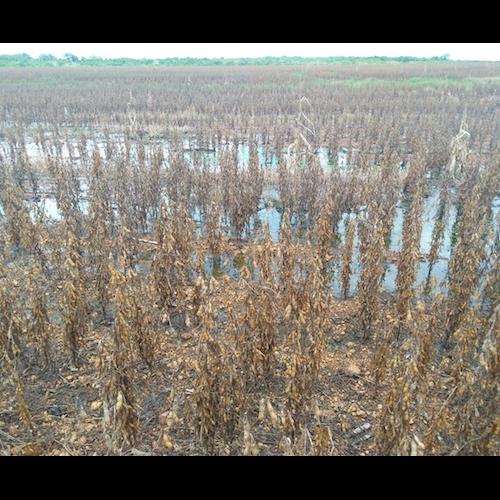“The last couple of decades especially we've seen our winters be wetter than previous decades,” Ford said. “That doesn't mean more snow necessarily, it just means overall more precipitation.”
For example, he says 20 of the past 25 winters in Peoria have been wetter than the city’s 120-plus-year average.
“Preparing for wetter-than-normal conditions to be more common or happen more frequently is something that farmers should be doing in Illinois,” Ford said.
Harm to farmers and cropsContinuous wet planting seasons present a challenge to farmers, as late planting pushes back their entire farm timeline.
Rep. Charlie Meier, R-Okawville, grows 1,600 acres of corn and soybeans on his farm east of St. Louis.
“Our planters started rolling on June 8, and it was not pretty,” he said.
Delayed planting causes delayed harvest, which can lower end-of-year yields like farmers saw in 2019. Late harvests also leave farmers less time for tilling fields before it gets too cold, which breaks up compacted soil and deep field ruts that can hold too much water.
“Those factors will all go into next year's crop,” he said.
Now in winter, Meier and other Illinois farmers are focused on getting tractors and equipment ready for planting season and hope they can better prepare their fields in the spring.
“Any sort of pre-planting or field preparation,” Ford said, however, “that gets delayed if we have a wetter-than-normal March or early April.”
As humans emit greenhouse gases such as carbon dioxide, they become trapped in the atmosphere. The more carbon in the atmosphere, the more moisture it can hold, increasing precipitation.
“The connections there are pretty strong,” Ford said of wetter planting seasons and climate change.
“In wet regions such as this, there's abundant water supply at the surface,” he explained. “So as the atmosphere can take in more water, it does.”
Scientists also expect heavy downpours to increase.
Decreases in crop production not only hurt farmers, but trickle down into other industries like corn elevators and trucking companies, says Mike Doherty, a senior economist at the Illinois Farm Bureau.
“Most of our ag businesses off the farm, which are a big part of the downstate ag economy, they all have lower revenues as well,” Doherty said.
A soggy spring could also spell danger for Illinois farmers vulnerable to further crop losses, he said.
“You have costs no matter how much of a crop you raise,” Meier said, including rent, equipment and supplies.
Government aid and insurance payments helped lessen the impact of low crop production last year, but they do not fix the problem.
“There is a legitimate concern here,” Doherty said, as to the ability of some farmers to make debt payments on capital investments like machinery and land improvements.
“That percentage of farmers is going to be a higher percentage than it was last year at this time,” he said. “We are poorly poised to deal with that.”
Meier said farmers may adapt by planting earlier, managing fields differently or using strains of crops that respond better to wet fields.
“You learn to start planning,” he said, adding that proactiveness helped him through periods of drought in the 1980s.
Constantly adapting to worsening weather conditions, though, might not work in the long term, especially since crop production is what brings in a farm’s income.
“Agriculture, especially here in the middle of the Grain Belt, is a volume business,” Doherty said. “You cannot make money off bushels you don’t grow or that you don’t have.”
Being at the mercy of Mother Nature, he said, will always be part of the job.
“This is the nature of farming. You can’t control the weather.”
Source - https://thesouthern.com












